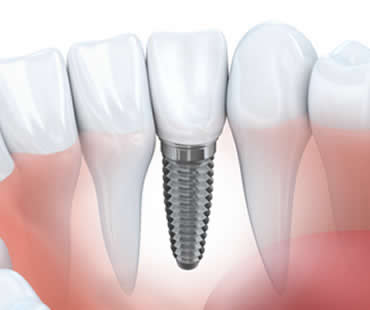
Dental implants are the best restorative choice for replacing a tooth that is missing. Whether the tooth has come out due to some kind of facial trauma or an infection or other issue, dental implants are the solution. The real difference in quality between a dental implant and other restorations such as bridges lies in the fact that the dental implant is placed directly into the patient’s jawbone, eventually fusing there through a process known as ossification.
Over time, ossification provides the kind of tooth base that is only seen elsewhere in natural teeth. When a dental implant is successful, it is as secure and as natural looking as a patient’s own original teeth; however, in some cases, dental implants fail. Sometimes they fail repeatedly. What’s causing these dental implant failures? Here are some potential causes.
Sometimes the implant doesn’t fuse with the bone and the bone shrinks away from the implant, leading to implant mobility or even the implant falling out. Patients who have weak bones due to age, osteoporosis, years of being edentulous (toothless) or another medical condition will find dental implants more challenging. If you’ve been having issues with failure to ossify, your dentist might recommend a bone graft to rebuild the jawbone to a healthy level so that dental implants can properly fuse.
In other cases, persistent infection may result in repeated implant failure. Signs of infection are continuous bleeding, swelling at the implant site or acute inflammation of the gum tissue at the implant site. Pus may be evident, or a bubble might appear on the gumline. Some health issues such as diabetes, auto-immune disorders or treatments like cancer therapies can weaken the immune system and leave the implant site vulnerable to infection. Your dentist might prescribe antibiotics or recommend you see an endodontist for a root canal treatment.
If you’re concerned about your dental implant, talk to Meriden dentist Dr. Hergott right away. Find out what steps you need to take to ensure that your dental implants are successful.
If you need a dentist in Meriden contact us today

You’re not the only one if you feel like your smile has become dull and yellowed. This happens to nearly everyone, and it is the most common complaint that people have about the look of their smiles. There is no reason to live with a discolored smile. Teeth whitening is available to restore your pearly whites.
There are a number of reasons that your smile has changed over the years. Aging causes tooth enamel to thin and allow the yellow-tinged dentin layer to show through. Dark-colored foods and drinks stain teeth, some medications produce the side effect of darkening teeth, and tobacco use creates difficult stains. Teeth may also change color due to mouth trauma.
Whatever the culprit is for your diminished smile, teeth whitening is a simple way to restore it. Whitening products contain bleaching agents that break up stains so that the color is less concentrated and your teeth look brighter. However, teeth whitening does not work in all situations. It does not affect restorations like veneers, fillings or crowns. Whitening is also not usually effective on stains resulting from injury or medications. Yellow teeth are the most likely to respond to teeth whitening, while brown or gray tones might be less improved.
There are numerous options for teeth whitening. Home products are available at your local drugstore like whitening toothpastes, gels, pens, strips and more. These methods focus on removing surface stains from your teeth. At-home bleaching kits are another option, typically obtained from your dentist, that involve filling a mouth tray with a special bleaching solution and wearing the trays for a time period like overnight. These kits are stronger than over-the-counter methods, but not as strong as professional whitening performed in a dental office. It is accomplished in about an hour in the dental chair using a concentrated bleaching agent and special lighting or laser to enhance the process, and provides the most dramatic results.
Consult your dentist for advice on the best whitening methods to use on your teeth. Every patient is different and certain methods may be more effective or comfortable for various people.
We treat patients from Meriden and the surrounding area

Veneers are a great solution for many people who are unhappy with their smiles and want a permanent improvement. These thin porcelain shells are bonded to the surface of teeth to make the smile more appealing. You and your dentist can choose the shade you prefer, and a minimal amount of preparation is required before attaching the veneers.
Many kinds of problems disappear with dental veneers. Some of the common reasons that people choose veneers include:
- tooth discoloration or staining
- crooked teeth
- worn teeth
- too much gums visible
- uneven teeth
- misshapen teeth
- bite problems
- overly sensitive teeth
No matter what flaws you might be getting dental veneers to hide, these restorations offer a number of advantages:
- Your real teeth may look unhealthy and damaged, but covering them with veneers gives them a healthy glow of a well-cared-for smile.
- Veneers look very natural, because the porcelain material is translucent and offers a glassy appearance.
- Porcelain resists stains so your smile will stay as white and bright as the day you got the veneers.
- Veneers last anywhere from ten years to a lifetime, depending on the quality of the application and your proper maintenance of them afterwards.
- There is no special care required other than your usual brushing and flossing routine.
- Veneers can increase your self-esteem, since you can feel confident that your smile is the best it’s ever been.
If you need a dentist in Meriden contact us today

Do you have children? Are you exhausted from driving all over town for clubs and meetings and appointments for your family? If you are finding yourself occasionally overwhelmed by the needs of your family, a family dentist can help you simplify one area of your life. A family dentist can see each member of your family, from the youngest to the oldest, sometimes on the same day in the same block of time!
Because of the rising popularity of family dental practices, you have more choices than ever to address the oral health needs of your entire family. Choosing the right one can be difficult and confusing. If you’re looking for a new family dentist, here are some factors you can consider when you’re choosing which family dental practice in your area is for you:
- How much training does this dentist have? How long has he or she been in business? All dentists must graduate from dental college, but a truly exceptional dentist will pursue continuing education courses in an effort to stay abreast of the latest methods and technology in their field. Ask what current certifications the dentist holds. How experienced is their staff?
- Are the employees and the dentist good with children? When you visit their offices, do you see an environment that’s inviting and warm? Are there games or activities for children of all ages? Are the magazines you see appropriate for all ages? Do the patients in the waiting area seem comfortable and relaxed? Does everyone you see seem happy? Did the front office staff greet you in a friendly manner? If any of the answers is no, then you should look at the practice more closely before you make an appointment.
- How modern is the office? A good family dentist will have current technology and sedation dentistry options to ensure a pleasant visit for all.
Choosing a family dentist is an important step. Don’t rush into it; do some research before you decide, and you can ensure that you make the best choice for your family.
If you need a dentist in Meriden contact us today

It’s a fact of life that teeth can become dingy and yellowed through the years. Your diet, age, personal habits and more affect the shade of your teeth. Even with the best care, it’s nearly inevitable that at some point you’ll want to brighten your smile. Once you pursue teeth whitening, you’ll want to be sure to make your new smile last as long as possible.
Over-the-counter products are readily available from your local drugstore and simple to use. However, they can take a long time to obtain full results and even then, you may not achieve the desired shade you’d like. Professional teeth whitening is the fastest and most dramatic way to brighten your smile.
If you spend the time and money to whiten your teeth professionally, making it last will be important to you. Results can last for a long time, but probably not forever. Here are some tips for making your white teeth last longer:
- Watch your diet especially carefully for the first 48 hours following treatment. Your teeth are at the most risk for staining during this timeframe.
- For the first few days, avoid eating known staining foods like blueberries, beets, dark soups, marinades, sauces, curry or tomato products.
- At first, avoid broccoli, green beans, peas, sprouts, corn, or skinned potatoes. These have increased risk of particles getting stuck into the highly susceptible tooth pores after whitening treatment.
- Watch out for citrus fruits that are high in acidity, which can also make your saliva more acidic. Your teeth are more prone to damage from acid when they already have increased sensitivity from the whitening chemicals.
- Avoid drinking dark colas or coffee, since both can stain your teeth no matter when you drink them.
- Get in the habit of drinking from a straw so that dark colored drinks don’t come into as much contact with your teeth.
Choosing the right foods and drinks after teeth whitening can make a big difference in the length of time your teeth stay white. Make the best decisions to enjoy your bright smile.
We look forward to seeing you in our Meriden dental office

Wisdom teeth are the third set of molars, and usually emerge in the late teens or early twenties. Standard dental practice is to remove wisdom teeth prior to them being fully formed when the roots have not yet had a chance to develop and fully root into the jaw. Younger patients usually have an easier recovery from surgery and many dentists believe early removal prevents future dental problems associated with wisdom teeth.
If your wisdom teeth were not removed as they emerged, there are some signs and symptoms that would indicate the need for extraction including:
- Wisdom teeth that are impacted, which means they have become trapped in the jawbone or gums.
- Wisdom teeth that are emerging at an awkward angle, causing pressure on adjacent teeth.
- Wisdom teeth that do not fit in your mouth, causing crowding of the surrounding teeth as well.
- Wisdom teeth that are suffering from decay or disease caused by the inability to keep them cleaned properly.
- Wisdom teeth that have developed fluid-filled cysts near the gumline.
- Wisdom teeth that are causing pain due to any of the above reasons.
The decision about whether or not to remove your wisdom teeth should be made in consultation with your dental professional. Your dentist or oral surgeon can assess the position and health of your wisdom teeth and make a recommendation for treatment.
If extraction is recommended, they may choose to extract one tooth or all four molars at once. Recovery from the outpatient procedure takes just a few days, and you will quickly be back to normal. Consult with your dental professional if you are experiencing any of these symptoms listed to determine if you should consider wisdom tooth removal to ensure your future good oral health.
We look forward to seeing you in our Meriden dental office














